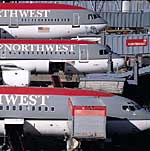By Mark Zdechlik
Minnesota Public Radio
January 17, 2002
Northwest Airlines Thursday posted a massive loss for last year. A costly combination of economic recession, coupled with a plunge in travel demand after September's terrorist attacks, left Northwest losing more than $200 million in the last three months of 2001. For the entire year, Northwest posted a loss of more than $400 million. Despite the red ink, the airline did better than Wall Street was expecting and the carrier says it's poised to starting making money when the economy turns around.
| |
|
|
|
||
Even before the terrorist attacks, the nation's airlines were having difficulties as the slowing economy cut into the critical business travel market. The events of Sept. 11 cemented fears that 2001 would be a losing year.
The Air Transport Association predicts when all the numbers are tallied, the U.S. airline industry will have losses for 2001 approaching $9 billion.
For Northwest Airlines, the world's fourth-largest carrier, the year's loss totalled $423 million. That compares to a profit of $256 million the previous year.
Much of the loss piled up after September's terrorist attacks. From October through December, Northwest lost $216 million. That figure would have been significantly larger had the airline not received $212 million during the period, as part its total $461 million share of the airline industry bailout.
Northwest CEO Richard Anderson says relative to almost every other major airline, Northwest performed well considering the circumstances.
"While the fourth quarter and the full year performance was disappointing, it was to be expected considering the unprecedented decline in business travel due to the economic slowdown - as well as the reduced demand resulting from the Sept. 11 terrorist attacks," says Northwest spokesman Bill Mellon.
Mellon says since the dramatic dropoff in air travel last fall, the trend for demand has been positive.
Money aside, Northwest did well operationally. It was ranked second in on-time performance, and recorded the second fewest number of lost baggage and customer complaints.
| |
|
|
|
||
Looking ahead, Northwest management predicted the airline will be one of the first major carriers to return to profitability.
Managers would not predict when they expect the airline will once again be profitable. But they did forecast a likely turnaround in demand for air travel in the second half of this year.
"We do need an economic recovery for Northwest to prosper in the future," says spokesman Bill Mellon. "We've made a lot of adjustments. We've sized the aircraft to the demand, and we're in as good a shape as any airline to weather the storm. We really are looking for an economic recovery later on this year to help us return to profitability."
Northwest says it's prepared to meet new security requirements as they are mandated. The airline says it expects no schedule disruptions beginning Friday, as it complies with the requirement that all checked baggage be screened.
The airline also says it expects to take advantage of operational efficiencies this year that will come with the opening of its new Detroit terminal next month. Major improvements at its hubs in Minneapolis-St. Paul and Memphis are also underway.
Although Northwest posted a huge loss, analysts say it could have been much worse. US Bancorp Piper Jaffray analyst Joel Denney says Northwest's CEO Richard Anderson cut costs aggressively after taking over from Jon Dasburg early in 2001.
"It's kind of strange to be talking a success with a $216 million dollar loss in the fourth quarter. But given everything that's happened with the economy and with the events of Sept. 11, it's actually a positive result for Northwest Airlines. And they're well-positioned for the future," Denney says.
Northwest ended 2001 with about 8,000 fewer employees than it started the year, the vast majority of them union workers. During the fourth quarter, Northwest flew a schedule that was about 16 percent smaller than the previous year.
Northwest spokesman Bill Mellon says as demand improves, the airline will conservatively add back capacity. As it increases operations, it expects to begin bringing back furloughed employees.


